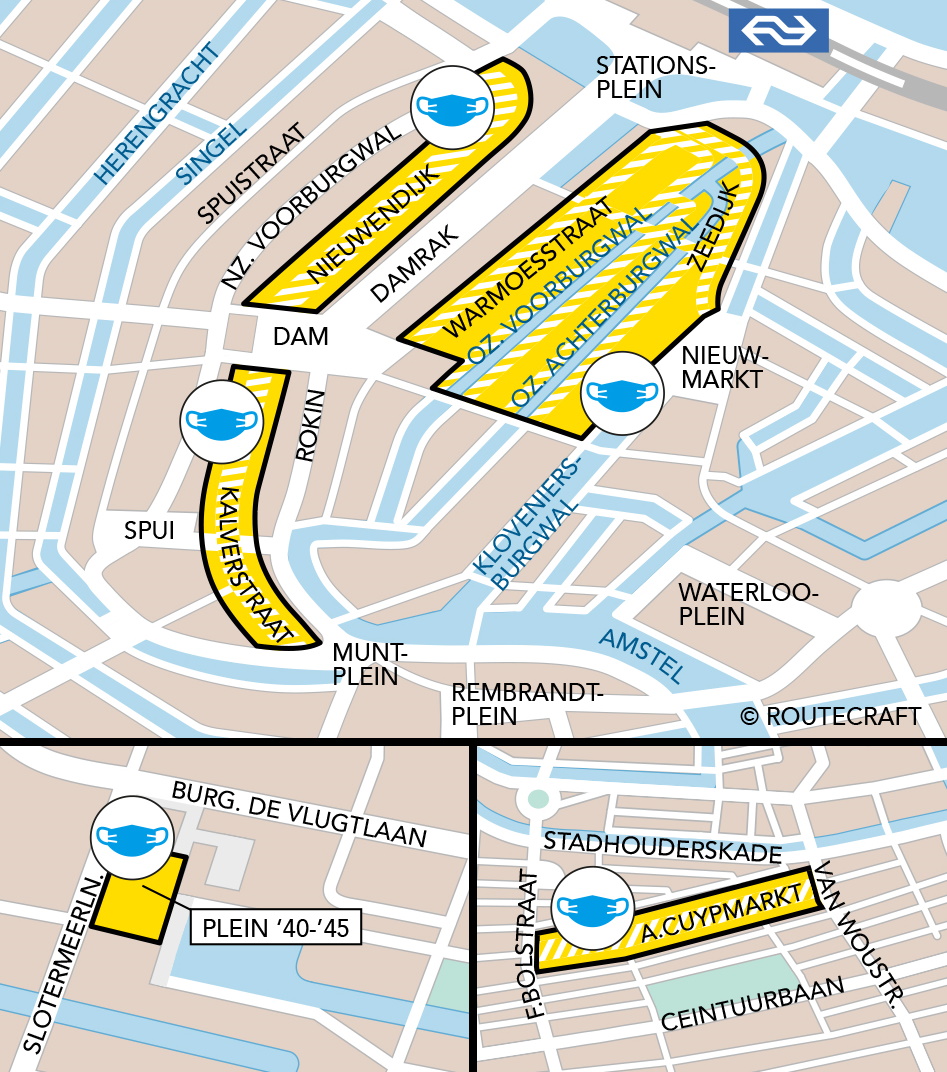While the city of Amsterdam and the Netherlands in general have handled their coronavirus response comparatively well, it is still important to follow the countries’ and cities’ guidelines to keep covid-19 contained in Amsterdam. To ensure that this happens the Dutch government and the city of Amsterdam have issued the following guidelines from the 5th of August.
All passengers aged 13 and over are required to wear a non-medical face mask. The fine for not wearing a non-medical face mask is €95.
Now it is mandatory for anyone the age of 13 and above to wear a non-medical face mask in certain parts of the city. These are areas where there is limited space and it is crowded, meaning other measures may not have had sufficient effect on preventing spread of the coronavirus.
The obligation to wear a face mask is a trial measure and does not replace the rule of keeping 1.5 metre distance. This map shows the areas in Amsterdam where it is mandatory to wear a face mask.
Where and when are face masks required?
When the trial launches, the use of face masks will be mandatory in the following locations:
- Nieuwendijk and Kalverstraat: on the street and inside shops during day and night (24/7).
- Red Light District (northern area, excluding Damstraat): on the street and inside shops during day and night (24/7).
- Plein ’40-’45 market: during the street market’s opening hours.
- Albert Cuypstraat market: on the street and inside shops during the street market’s opening hours.
The areas where face masks are mandatory may be expanded in the coming weeks. The obligation to wear a face mask does not apply to catering businesses (including terraces), museums, amusement arcades, businesses active in the sex industry, and gyms. Nor does it apply to private homes, gardens or offices.
In Rotterdam, people will need to wear a face mask in shopping areas in the centre, such as the:
- Coolsingel.
- Lijnbaan.
- De Meent.
- Nieuwe Binnenwegplein.
- Markets on the Visserijplein and Afrikaanderplein.
- Binnenrotte will also have the rule, and so will the covered shopping malls Alexandrium and Zuidplein.
Who has to wear a mask?
The obligation to wear a face mask applies to everyone 13 years and older, for both visitors and the staff in shops and markets. There is an exception for staff working behind a desk or cash register that is equipped with a protective sneeze guard.
How do you know where a face mask is mandatory?
Signs will be on display in all of the trial locations, clearly communicating that it is necessary to wear a face mask. During the opening period of the trial, hosts will be present on the streets to inform people about the rules and offer free face masks if needed.
Are there exceptions to the obligation to wear a face mask?
- Children who are 12 and under no not have to wear a face mask.
- If you cannot wear a face mask due to medical reasons, you will also be exempt. Please note, however, that you must be able to substantiate the reason why you cannot wear a face mask.
- There is also an exception for staff working behind a desk or cash register that is equipped with a protective sneeze guard.
Apart from these three exceptions, the obligation to wear a face mask applies to everyone. For example, if you are walking your dog, taking out your household waste or exercising in any of the areas, it is necessary to wear a face mask.
Eating or drinking in an area where a face mask is mandatory?
Please keep your face mask on wherever you are required to wear it. If you would like to stop for something to eat or drink, we encourage you to do so outside the area where the obligation to wear a face mask applies, whenever possible. In catering establishments and on terraces, it is not compulsory to wear a face mask.
What type of non-medical face mask do I need to wear while travelling in the Netherlands?
When travelling by public transport, taxi, coach or car, a non-medical face mask that does not have a filter and is made of a material such as cotton is enough. These types of face mask are sold in places like supermarkets and pharmacies. You can also make your own.
You may not use a scarf, face shield/visor, snood, bandanna, the collar of a jacket, or a non-medical face mask made from a sock, for instance. Gas masks should also not be used.
Can I buy a non-medical face mask at train stations in the Netherlands?
At train stations, non-medical face masks are for sale in the following shops: Kiosk, AKO, Albert Heijn, HEMA and Etos. They can also be bought from vending machines on platforms.
What should I do with my non-medical face mask after using it?
After you have used a disposable non-medical face mask once, you should dispose of it in a normal waste bin. Non-medical face masks cannot be recycled. You should throw away disposable gloves in the same way after one use. If you buy or make a cotton reusable non-medical face mask, you can wash and re-use it. If it breaks or wears out, you should dispose of it in the same way as a disposable non-medical face mask.
Google Maps launched a bunch of features to help you get more information about coronavirus-related regulations. As cities are opening up around the world, authorities are enforcing new rules for public transit to maintain safety and social distancing.
If you have any further questions, please do not hesitate to visit our reception and ask for help. The reception is open 24/7 and here you can also buy masks in case you need them.

